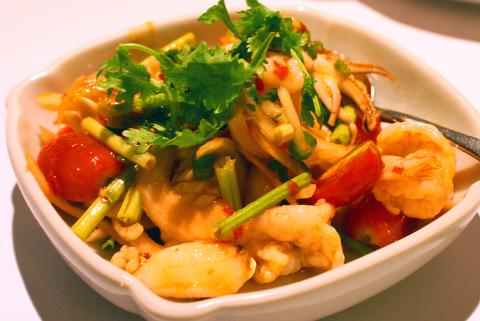Walking out on to the seventh floor of Building A9 of Xinyi Shin Kong Mitsukoshi (新光三越), we are met with the fragrance of lemon grass and coconut milk, the smell immediately drawing our attention towards Thai Town and its set lunch menu on a lectern at the restaurant’s entrance. At first glance, our party of three is astounded: NT$630 for three. We only later did we find out that the price is actually NT$630 per person. It’s still worth it.
Thai Town has seven locations throughout Taipei as well as branches in Taipei County, Taichung and Kaohsiung (www.thaitown.com.tw). The management boasts that it maintains strict control over the training of its staff and the quality of its ingredients so that what you get at one location is of comparable quality at another. I cannot vouch for the other locations, but our party was heartily satisfied with the meal we were served.
The tastefully finished interior of faux wood walls and floors punctuated here and there with trees had immediate appeal. Floor to ceiling windows offer glimpses of passing shoppers loaded down with bags of newly bought goods.

Photo: Noah Buchan, Taipei Times
We ordered the six-course lunch, which includes a choice of shrimp pancake, Thai seafood salad, beef stir-fry, chicken curry, fried vegetables, dessert and a drink. A la carte prices are in brackets.
Our drinks arrived first. Long strips of fresh coconut floated in the slightly sweet coconut juice (NT$90), while the iced tea (NT$90), with its generous addition of lemon, was sour enough to pucker the face.
The spicy Thai seafood salad (NT$300) and spicy shrimp pancake (NT$320) came next. The slightly salty pancake, which featured chunks of baby shrimp nestled between a crispy exterior, went well with the piquant and slightly lemony marinade of the salad, which was topped by generous portions of fresh crab, shrimp and cuttlefish. This Thai salad was a crowd favorite, our table competing for the last morsel, and left us panting for more.
The main course was a trifecta of different flavors. First came the beef stir-fry, a Massaman curry (NT$300). Tender slices of beef, chunks of green pepper and onion floated in a spicy-sweet curry sauce and covered with swaths of coconut cream topped with needles of lemon grass.
The decadence continued with a green curry chicken in coconut sauce (NT$280). Subtle flavors of basil and lemongrass were discernable through the sweet coconut milk. The fried water convolvulus with shrimp paste (NT$180) was the meal’s only miss because of the addition of dried shrimp, which made an already salty dish saltier. We left most of it on the plate.
But then came dessert: black sticky rice (NT$95) served hot with taro in coconut milk and ice. Thai Town’s interpretation of this dessert, with its chewy warm rice and taro contrasting with the sweet coconut, ranks as one of the best I’ve tried in Taipei.

A “meta” detective series in which a struggling Asian waiter becomes the unlikely hero of a police procedural-style criminal conspiracy, Interior Chinatown satirizes Hollywood’s stereotypical treatment of minorities — while also nodding to the progress the industry has belatedly made. The new show, out on Disney-owned Hulu next Tuesday, is based on the critically adored novel by US author Charles Yu (游朝凱), who is of Taiwanese descent. Yu’s 2020 bestseller delivered a humorous takedown of racism in US society through the adventures of Willis Wu, a Hollywood extra reduced to playing roles like “Background Oriental Male” but who dreams of one day

Gabriel Gatehouse only got back from Florida a few minutes ago. His wheeled suitcase is still in the hallway of his London home. He was out there covering the US election for Channel 4 News and has had very little sleep, he says, but you’d never guess it from his twinkle-eyed sprightliness. His original plan was to try to get into Donald Trump’s election party at Mar-a-Lago, he tells me as he makes us each an espresso, but his contact told him to forget it; it was full, “and you don’t blag your way in when the guy’s survived two

Nov. 18 to Nov. 24 Led by a headman named Dika, 16 indigenous Siraya from Sinkan Village, in what is today’s Tainan, traveled to Japan and met with the shogun in the summer of 1627. They reportedly offered sovereignty to the emperor. This greatly alarmed the Dutch, who were allies of the village. They had set up headquarters on land purchased from the Sinkan two years earlier and protected the community from aggressive actions by their more powerful rivals from Mattau Village. The Dutch East India Company (VOC) had been embroiled in a bitter trade dispute with Japan, and they believed

Burnt-out love-seekers are shunning dating apps in their millions, but the apps are trying to woo them back with a counter offer: If you don’t want a lover, perhaps you just need a friend? The giants of the industry — Bumble and Match, which owns Tinder — have both created apps catering to friendly meetups, joining countless smaller platforms that have already entered the friend zone. Bumble For Friends launched in July last year and by the third quarter of this year had around 730,000 monthly active users, according to figures from market intelligence firm Sensor Tower. Bumble has also acquired the